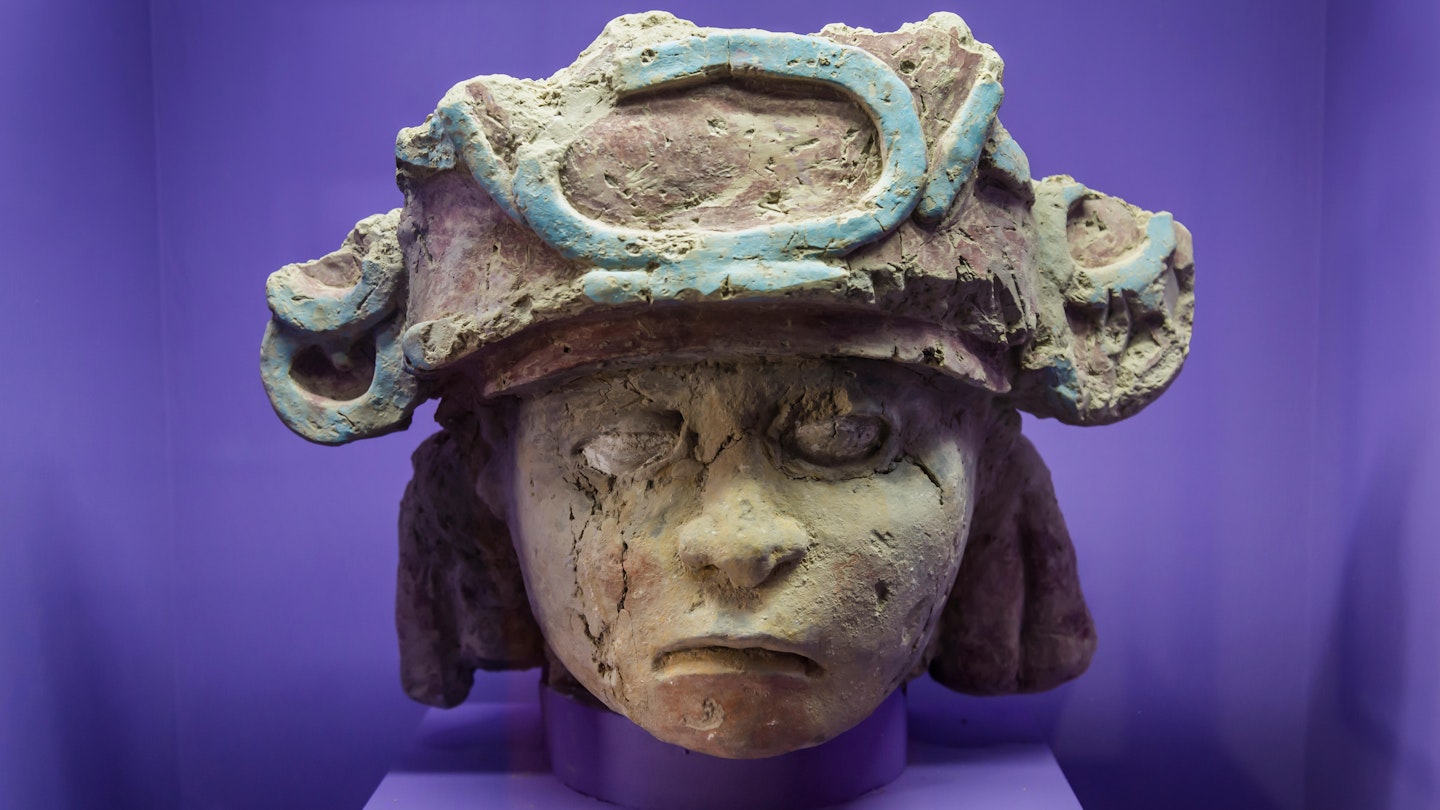Oaxaca’s museums and galleries overflow with dreamlike art, captivating pre-Hispanic relics, and exquisite handmade crafts often inspired by indigenous mythology – it’s one cool place to channel your inner culture vulture.
The capital’s downtown galleries, and there are many, display some of the richest and most inventive folk art in Mexico, such as brilliantly painted alebrije animal sculptures and intricately designed Zapotec rugs. They also exhibit paintings from Oaxaca’s most influential master artists such as Francisco Toledo and Rufino Tamayo.
Equally impressive are the city’s first-rate museums and art centers, many of which occupy splendid colonial buildings. For a crash course in regional history, don’t miss the world-class Museo de las Culturas de Oaxaca. For cutting-edge installations, venture out to the low-key town of San Agustín Etla, where a pioneering modern art center in the verdant Sierra Madre foothills provides a welcome respite from the bustling city.
Here are just some of the noteworthy museums and galleries in Oaxaca.
Museo de las Culturas de Oaxaca is the Best Museum for Regional History and Culture
If you only have time to visit one museum while in Oaxaca, make it this gem. Granted, you’ll need at least a couple of hours to explore the 14 halls housed in the museum’s sprawling campus – a former monastery – but the majestic 16th-century architecture is worth the price of admission alone.
Displays in the Museo de las Culturas de Oaxaca are devoted to regional history and culture, from the pre-Hispanic era to present day. An intriguing treasure trove of 14th-century Mixtec artifacts discovered at Monte Albán in 1932 is a highlight, which includes an ancient skull encrusted with a turquoise mosaic.
Centro de las Artes de San Agustín is the Best Gallery for Contemporary Art
Sitting pretty in the foothills of the Sierra Madre mountains, this old textile factory was lovingly converted into one of the city’s top art centers thanks to a renovation project spearheaded by famed Oaxacan painter Francisco Toledo. CaSa, as the space is also called, draws high praise for its absorbing exhibits, concerts, dance performances, and innovative ecological design.
To get here, head 11 miles northwest of Oaxaca to San Agustín Etla, a quiet town known for its traditional Day of the Dead festivities. After checking out the cutting-edge installations, take a stroll around the surrounding grounds amid waterfalls and lush vegetation. On Sunday, savor homemade tamales and delectable memelas in an open-air food market, and if you’re up for an easy hike, the nearby “Aqueduct Trail” rises up into the scenic hills.
Voces de Copal Displays Fantastic Crafts and Sculptures
The meticulously crafted alebrijes (colorful copal-wood animal figurines) at this downtown gallery cost a pretty peso, but even if you have no intention of buying one, you should definitely marvel at the brilliant sculptures tastefully laid out in a superb colonial building.
Hailing from the workshop of Jacobo and María Ángeles, in nearby San Martín Tilcajete, these distinctive alebrijes, many with designs based on ancient mythical creatures, take anywhere from one month to four years to make. For an up-close look at the production process, consider a day trip for a tour of the couple’s lively facility about 14 miles south of Oaxaca.
Museo de Arte Prehispánico Rufino Tamayo Has a Large Collection of Pre-Hispanic Art
Showcasing a fascinating collection of ancient artifacts amassed by the renowned Oaxacan painter Rufino Tamayo, relics in the Tamayo museum are exhibited in color-coded backlit cases to highlight their aesthetic value. Tamayo, a modernist artist of Zapotec heritage, was known for his use of vivid colors.
The displays, which include figurines dating back to 1250 BCE, feature objects made by the ancient Maya, Zapotecs, Mixtecs, and Toltecs. The 18th-century building also hosts temporary arts and crafts shows, concerts, and other cultural events throughout the year.
Centro Fotográfico Manuel Álvarez Bravo Hosts Photography Exhibits
Named after the revered Mexican photographer Manuel Álvarez Bravo, this storied colonial center hosts rotating exhibits of images captured by contemporary talent from Mexico and abroad. Occasionally, it shows works from its permanent collection of some 100,000 photographs.
Oaxacan painter Francisco Toledo founded the exhibition center alongside its sister facility, the Graphic Arts Institute of Oaxaca. The permanent Colección Toledo includes notable pieces by Álvarez Bravo, Henri Cartier-Bresson, Graciela Iturbide, Mary Ellen Mark, and other influential figures in the world of photography.
La Mano Mágica is the Best Gallery for Textiles and Folk Art
Anyone looking for a broad overview of Oaxaca’s folk art scene should visit this downtown gallery founded by the late Arnulfo Mendoza, a master weaver and painter. La Mano Mágica specializes in colorful rugs woven on hand-operated looms and houses unique handicrafts and paintings from some of Oaxaca’s top artists.
For more context on the ancient art of weaving, consider visiting the Museo Textil de Oaxaca, which stocks over 10,000 traditional textile pieces from Oaxaca and abroad, or head straight to Teotitlán del Valle, where weavers have been crafting rugs since pre-Hispanic times.




